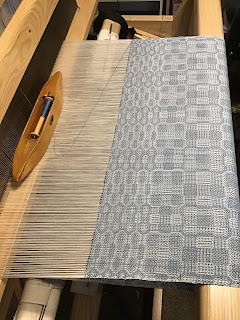Yes, there IS a threading mistake in this warp. It's hard to see from this angle, but it's there.
The photo shows the end of the towel I just finished weaving, so you can see the end of the motif and the hem area. I tend to adjust the length of my towels by designing a motif, then adding or subtracting to the hems to get the final length.
Sometimes I can get pretty close. Other times, not so much. But they are tea towels and a bit of a change one way or another isn't a deal breaker. They will still dry dishes.
I suppose, in a way, I was always open to changes. Perhaps it was hardwired into my personality, or perhaps Life Happened frequently enough I had to learn to go with the flow, bend to the inevitable. Be flexible. Move feasts to another time, another day. Or maybe it was all of it.
As a kid, I had to contribute to the family by doing 'chores' although they were never labelled as such - it was just 'do this thing' or 'do that thing'. In August mom would begin canning and I would be instructed to wash canning jars, cut up the peaches/pears/apples - bite size or slices, depending on what she was planning.
It would get hot in the house with the stove going from before I would wake up until long after I'd gone to bed.
Jams. Jellies. Pickles. Canned fruit, so that we would have some in the winter. Because in those days, fruit was seasonal, not year round.
One of the things I really hated was helping with the raspberry jelly. It was my job to pour the washed berries into the colander, a cone shaped aluminum one, then using a wooden tool squeeze the berries against the metal and get the juice out, leaving the pulp behind. (She would put that into jam.)
I loathed the sound and feel of the wooden tool rubbing the seeds against the metal. It made my teeth ache. I nearly cried from the sensory agony of it.
When I complained, my mother's reaction was "Do you want jelly for your toast this winter? Then do it!"
I learned to set my discomfort aside for later gratification - home made raspberry jelly on my toast when the snow was blowing.
So I learned. I learned that not everything in life was going to be perfect. That for some things there was going to be a cost, and sometimes that cost had to be paid up front, long before the benefit.
I'm not happy about the threading error. But not enough to take the several hours it would require to make it be gone, when it is in no way interfering with the function of the cloth.
My eye snags on the 'mistake' constantly - an irritating reminder that I'm Still Not Perfect. That I still make mistakes. That my level of emotional discomfort at contemplating my imperfectness is still less than the actual physical discomfort I would experience by cutting this warp off and re-threading a quarter of it.
As I have been weaving this warp, another in a series of warps with mistakes in them, I have been thinking. I have been thinking about all the overshot coverlets I've seen, with threading/treadling errors in them, in museums, people oo-ing and ah-ing over how beautiful they are. THEY don't see the mistakes. They see the intent. The fact that they were very obviously used and loved, some by generations.
And I put myself into the continuum of history. I'm just another person, doing the best she can, juggling deadlines, obligations, working towards perfection - and never really quite obtaining it. But never giving up. Still trying. Still making things. Some of them with imperfections in them.
And I thought about 'crazy quilts' made from scraps of cloth. They are not perfectly sewn with teeny tiny stitches in optical illusion designs that knock your socks off. They are made with all sorts of weights, colours, designs of cloth, usually in weird, wonderful, scrap shapes, assembled with some care but more than likely utmost speed, because a family needed a quilt to keep them warm.
As I look at this cloth, I see a similar kind of effect - a motif that is wonky - not perfect. And I learn to accept it for what it is - not perfect. But perfectly functional.
And why, I suppose, I am willing to tolerate the discomfort of wearing a mask to prevent getting sick from an air borne virus. Willing to accept current discomfort for hopefully a reduction in viral load in the air. And why my workshop in the new year will be masks required. If students want to learn from me, they will have to accept the discomfort of protecting me.

No comments:
Post a Comment